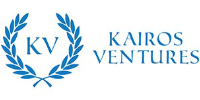Dr. James Pikul, assistant professor in the Department of Mechanical Engineering and Applied Mechanics in the Penn School of Engineering and Applied Sciences, and Zakaria Hsain, a Ph.D. candidate in his lab, have developed highly innovative metal materials that can “self-heal” under ambient conditions.
The self-healing process takes advantage of electrodeposition phenomena to promote fast ion transport from portions of the metal material not under stress to reinforce portions of the material that are in need of support. This unique functionality allows controlled strengthening of cellular metals in response to stresses – very similar to how a bone becomes stronger after being exposed to repeated stress.
A patent application covering the new self-healing technology has been filed by PCI.

Left: Dr. James Pikul; Right: Zakaria Hsain
LignaMed, LLC was created to bring newly identified bioactive natural agents, such as the lignan SDG, forward from the research benchtop into the clinic for the treatment of orphan and hard-to-treat lung diseases, such as malignancy and radiation toxicity. Over the past six years, the company has advanced steadily from early stage discovery to advanced preclinical work with generous grant funding from both the NIH and NASA. LignaMed’s lead product, LGM2605, is being developed for the improvement of donor human lungs for transplant surgery and for the effective treatment of corticosteroid-resistant asthma. The company has worked closely with PCI, licensing patents that protect the production and use of LGM2605 to improve human health, several having issued recently in the USA (US 10,030,040, US 9,987,321 and US 10,045,951)
LignaMed, LLC was founded in 2013 by Dr. Melpo Christofidou-Solomidou, Research Professor of Medicine at the Pulmonary Allergy and Critical Care Division of the University of Pennsylvania’s Perelman School of Medicine, in partnership with PCI.

PCI helped to facilitate a $91 million multi-year R&D collaboration between Penn’s world-leading Gene Therapy Program, led by Dr. James M. Wilson, Professor of Medicine in Penn’s Perelman School of Medicine, and biopharmaceutical powerhouse Amicus Therapeutics. Together, the alliance partners will pursue research and development of novel gene therapies for a variety of rare and orphan diseases including Pompe disease, Fabry disease, CDKL5 deficiency, and an additional rare metabolic disorder.
In a complementary move indicative of the importance of this powerful new partnership, Amicus also announced the opening of a major new R&D facility a few blocks from Penn at the University City Science Center.
Cabaletta Bio, Inc., a biopharmaceutical company focused on the discovery and development of cellular therapies for B cell-mediated autoimmune diseases, entered into an exclusive license agreement and two multi-year sponsored research agreements with Penn that were facilitated by PCI.
The Company it is working closely with Penn to develop a first CAAR-T product for the treatment of mucosal pemphigus vulgaris (mPV) based on compelling proof-of-concept data published in Science by a Penn research team led by Aimee Payne, M.D., Ph.D., Albert M. Kligman Associate Professor of Dermatology and Michael Milone, M.D., Ph.D., Associate Professor of Pathology and Laboratory Medicine.
Cabaletta’s foundational platform and lead assets are based on a body of work conducted at Penn by Drs. Payne and Milone, both of whom are co-founders of the Company.
During FY19, Caballeta Bio completed an $88 million Series A financing to advance its lead asset, DSG3-CAART, into clinical development.
PCI supported the negotiation of a far-reaching multi-year R&D collaboration and license agreement between Passage Bio and Penn’s Gene Therapy Program and the Orphan Disease Center.
Recently spun out of Penn, Passage Bio is a fully integrated genetic medicines company with a mission to develop a portfolio of life-transforming AAV-delivered therapeutics for the treatment of rare monogenic central nervous system diseases. The company was co-founded by Penn and Dr. James M. Wilson, Professor of Medicine and Rose H. Weiss Orphan Disease Center Director, and is based in Philadelphia. PassageBio formally launched with a $114 million Series A investment round led by OrbiMed Advisors with additional contributions from Frazier Healthcare Partners, Lilly Asia Ventures, New Leaf Venture Partners, Versant Ventures, and Vivo Capital.

Founded in 2016, Chip Diagnostics is a Penn spinout and Philadelphia-based medical device company based on research from the lab of David Issadore, Associate Professor of Bioengineering and Electrical and Systems Engineering, in the School of Engineering and Applied Science.
Chip Diagnostics develops technologies and digital assays for use on readily available mobile devices that offer minimally-invasive early cancer detection and screening. In June, Chip Diagnostics was announced as the awardee of the 1st inaugural JPOD @ Philadelphia QuickFire Challenge, sponsored by Johnson & Johnson Innovation—JLABS, which provides the company $30k in grant funding for research on microfluidic diagnostic devices as well as access to educational programming and mentoring opportunities via the JPOD @ Philadelphia based at the Pennovation Center.
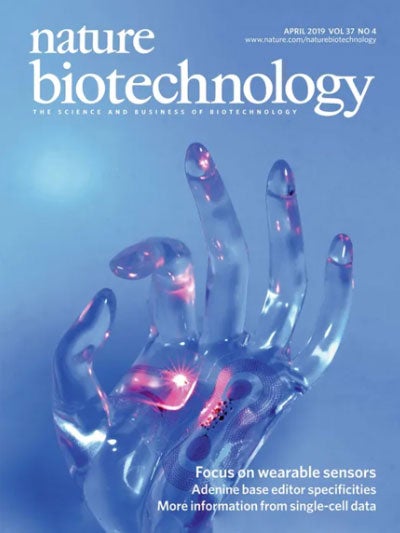
Cover of Nature Biotechnology volume 37, pages 370–375 (2019)
Penn was ranked number one in patent filings for cell and gene therapy by Nature Biotechnology in an analysis tracking the rise of the CAR-T immunotherapeutic industry via worldwide trends in related patent filings. There has been an unprecedented surge of product development and business creation activity in Philadelphia’s ‘Cellicon Valley’ sector, and the Nature analysis highlights the world-wide impact of Penn and its faculty as the “undisputed leader” in this space.
For the third year in a row, Penn was ranked the 4th most innovative university in the world by Reuters. The rankings are based on research citations, patents filed, granted and cited, as well as other key factors.
The past few years have produced a massive increase in cell and gene therapy research, commercialization, and economic development activity in Greater Philadelphia. The branding concept, ‘Cellicon Valley,’ was created to describe and further promote this fast growing sector.
As of November 2018:
Penn and Penn’s Perelman School of Medicine are recognized international leaders in cell and gene therapy research and development thanks, in no small part, to the extraordinary work of longtime faculty researchers and pioneers such as Carl June, Jim Wilson, Jean Bennett, Bruce Levine, and others. These pioneers, along with a new group of emerging faculty innovators, are actively partnering with Penn and PCI to continue leading the way in the cell and gene therapy space with a wave of exciting commercialization activities and related startups and alliances.
Since their launch, 18 startups have raised more than $650 million in investment capital. The startups, all founded by faculty at Penn’s Pereleman School of Medicine include:
Furthermore, the launch of 15 major Industry Alliances in the cell and gene therapy space have also generated more than $500 million in sponsored research dollar support back to Penn.
To read more about how Penn has led the rise of Cellicon Valley:
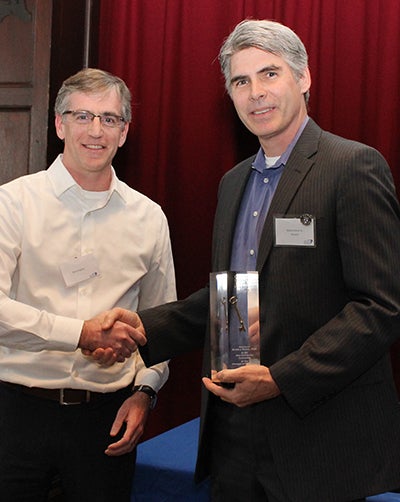
PCI’s Mark Engleka, Associate Director of Corporate Alliances, shaking hands with Celebration of Innovation award winner Dr. Daniel J. Powell, Jr. Associate Professor of Pathology and Laboratory Medicine
PCI hosted its third annual Celebration of Innovation on November 28, 2018. The event honored all of Penn’s patent awardees for the prior fiscal year, and attendees included faculty from across the University as well as PCI’s internal and external partners.
More than 200 faculty, partners and supporters joined PCI for this special evening. Geoffrey Garrett, Dean of the Wharton School, delivered keynote remarks, and six special awards were presented to Penn faculty and partners for significant commercialization accomplishments. The 2019 Celebration of Innovation event will be Wednesday, December 3.
As part of Penn’s participation in PhillyTechWeek, PCI partnered with PACT (Philadelphia Alliance of Capital and Technology) to showcase the Pennovation Center’s robotics labs, including innovative new research and demonstrations from startups, faculty and students. The demos illustrated exciting advancements in robotics, drones, and AI tech that are already transforming our everyday lives and work.

Ghost Robotics co-founder Gavin Kenneally and the company’s Vision robot.
Established in 2015 via a grant from the National Science Foundation to PCI, the Penn I-Corps Site supports faculty and students through curriculum-based training on validating startup ideas through potential customer inquiry and discovery. Teams that participate in the program receive training, technical assistance, mentorship, introductions across the regional startup ecosystem, and grants of up to $3,000.
Eleven cohorts with 286 participants from across Penn have been trained by the Penn I-Corps Site since 2015, with 115 teams graduating from the program. There are now 37 active startups who are Penn I-Corps graduates, and together they have raised approximately $8.5 million from different types of grants and investments and have created 58 jobs.

I-Corps teams at an annual showcase.
The Penn Medicine Co-Investment Program, launched by the Trustees of the University of Pennsylvania and Penn Medicine in 2018, is a $45 million committed fund dedicated to investment in companies with Penn Medicine faculty support and leveraging Penn-owned intellectual property, that emerge from the world-class research conducted at Penn Medicine and within the University of Pennsylvania Health System.
The Co-Investment Fund focuses on making multi-stage company investments in the areas of cell therapy, gene therapy, and connected health sectors.
To date, the Co-Investment Fund has made investments in four companies:
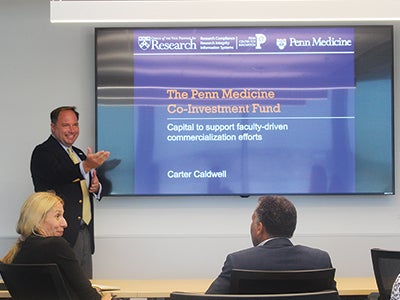
R. Carter Caldwell, Program Director, presenting on the Penn Medicine Co-Investment Fund
The Commercialization Guide offers faculty and external partners an easy-to-use, accessible, and helpful reference to help pursue commercial partnerships and entrepreneurial activities at Penn.
The guide provides comprehensive and detailed information towards working with PCI on many different types of commercialization activities, and it also covers numerous key topics such as: Penn’s Patent Policy, creating a startup at Penn, the process for patenting intellectual property, disclosing conflicts of interest, and other important answers about the commercialization process.
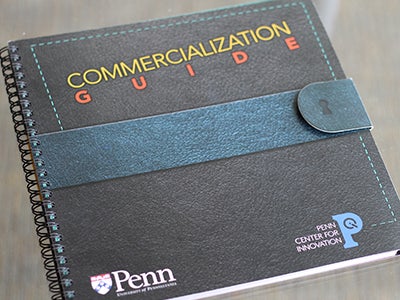

During the J.P. Morgan Healthcare Investor Conference in San Francisco last January, PCI and Wharton San Francisco hosted more than 300 investors, corporate partners, and Penn alumni for a presentation entitled Innovation@Penn: Programs and Partnerships.
The keynote discussion, moderated by PCI Managing Director John Swartley, featured Melinda Richter (Global Head, Johnson & Johnson Innovation, JLABS) and Craig R. Carnaroli (Executive Vice President, University of Pennsylvania) discussing Penn and Johnson & Johnson’s new partnership at the Pennovation Center and the opening of the nation’s first JPOD in Philadelphia.
The fireside discussion was followed by a panel of Penn's neuroscientific innovators and startups, including:
PCI has hosted this innovation event during the JP Morgan Healthcare Conference for the last four years. The event provides an excellent opportunity for active networking and to market and build interest in Penn’s portfolio of innovative resources, entrepreneurial activities and groundbreaking technologies.

Melinda Richter (Global Head, Johnson & Johnson Innovation, JLABS) and Craig R. Carnaroli (Executive Vice President, University of Pennsylvania).
For the third year in a row, PCI and selected Penn startups traveled to Austin, TX to participate in the South by Southwest (SXSW) Interactive Trade Show. The startup companies that traveled with PCI to SXSW included:
The teams joined PCI in presenting their companies to attendees at the event and participated in an alumni pitch and networking sessions.
Penn was also a sponsor of Amplify Philly, a campaign that brings together universities, companies, and economic development agencies to promote Philadelphia’s innovative and creative expertise on the world stage at SXSW.

PCI coordinated with centers across Penn to ensure that the University’s innovation activities were highlighted at BIO2019 in Philadelphia.
The 2019 conference was based at the Philadelphia Convention Center and provided an ideal opportunity to showcase all the amazing biotech innovation underway at Penn and across the city. In addition to being featured as part of the official conference program, Penn’s biotech and innovation leaders could be found at showcases and events across the Greater Philadelphia and participated in PCI’s official networking program that featured talks about Penn’s commercialization activities and a startup showcase.
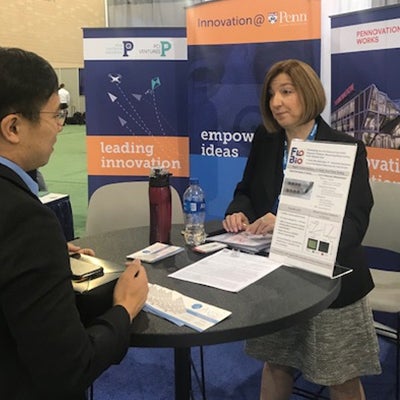
The PCI booth at BIO 2019
The Pennovation Accelerator, a six-week program focused on developing go-to-market strategies for new company efforts, launched in 2018 to provide in-depth assistance to a group of early stage startup companies from across the region.
The 2019 cohort of nine companies were chosen from more than 60 applicants and represented a variety of industries - from software to medical devices and consumer products. Cohort companies were hosted at the Pennovation Center and participated in weekly educational sessions presented by subject matter experts.
The Pennovation Accelerator concluded with Pitch Day, where each company gave an impressive 5-minute pitch to an audience of 60 guests, followed by questions from a panel of judges.

Participants in the summer 2019 Accelerator.
Membership at the Pennovation Center continued to grow in its third year of active operation, and new tenants included three winners of the University of Pennsylvania's President's Innovation Prize:
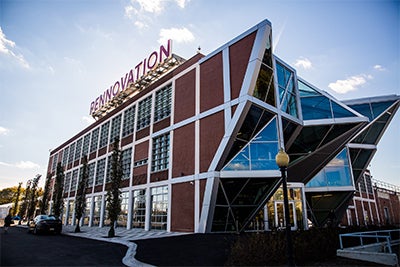
In November 2018, Penn officially launched JPOD @ Philadelphia, a new collaboration between the University and Johnson & Johnson Innovation, and the first JPOD ever launched in the United States. The goal of the JPOD is to identify and accelerate the development of early-stage healthcare solutions drawn from the Philadelphia region’s life science ecosystem that address significant unmet patient and consumer needs in medical devices, pharmaceuticals, consumer, and health technologies.
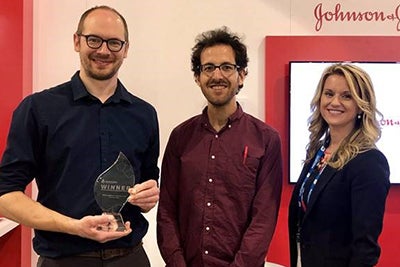
Joshua Buser (Chip Diagnostics, David Issadore (Penn Engineering/Chip Diagnostics), Katherine Merton (former head of JLABS New York City, Boston, and Philadelphia)
This past year, Kairos Ventures and PCI (via its PCI Ventures division) formed an exciting new partnership to provide Penn spin out companies and technologies additional access to vital early stage capital.
Kairos Ventures, a California-based early stage venture capital investment firm with more than $100M in capital resources under management, is dedicated to investing in research from top universities and chose Penn as one of its dedicated early partners. The Kairos team works closely with PCI Ventures in reviewing new company opportunities emerging from Penn and recently led the Series A round of Linnaeus Therapeutics.

